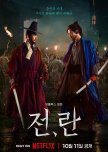The Triangle of Warfare
You know how some movies feature a love triangle, where three people are involved in a romantic drama that can only end with two? Here, we have something akin to a *fighting triangle*, interestingly set up to represent the three parties involved in the conflict: the imperial guards, the slaves, and the Japanese enemies in this historical period of Korean history.
Korean movies usually succeed in conveying strong emotion, and this movie has all the elements of a great drama, spiced up with thrilling battle choreographies. But for some reason, I couldn't empathize with the characters emotionally— basically none of them. The story is great, the actors are very good, and the production is top-notch, but something was not in the right place for a perfect epic, so I couldn't fully enjoy the film. I definitely appreciated the scenery, with its beautiful and sometimes brutal shots, but where the film should have been strongest—in the emotional clashes between the protagonists—something was missing, and I can't fully explain what it is. One of the reasons could be the movie's pacing, which wasn't fluid and jumped from one thing to the next, making it seem like the director didn't focus enough on the central plot.
What I really liked, however, was the theme about Korean society and the relationship between the upper and lower castes. There are echoes of a message that we should all be equal, whether someone is an emperor or a slave, and we know that because of this very message, the Catholic faith in Korea was violently suppressed in the early 19th century.
Korean movies usually succeed in conveying strong emotion, and this movie has all the elements of a great drama, spiced up with thrilling battle choreographies. But for some reason, I couldn't empathize with the characters emotionally— basically none of them. The story is great, the actors are very good, and the production is top-notch, but something was not in the right place for a perfect epic, so I couldn't fully enjoy the film. I definitely appreciated the scenery, with its beautiful and sometimes brutal shots, but where the film should have been strongest—in the emotional clashes between the protagonists—something was missing, and I can't fully explain what it is. One of the reasons could be the movie's pacing, which wasn't fluid and jumped from one thing to the next, making it seem like the director didn't focus enough on the central plot.
What I really liked, however, was the theme about Korean society and the relationship between the upper and lower castes. There are echoes of a message that we should all be equal, whether someone is an emperor or a slave, and we know that because of this very message, the Catholic faith in Korea was violently suppressed in the early 19th century.
Questa recensione ti è stata utile?






